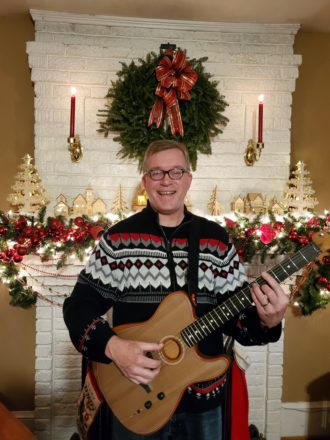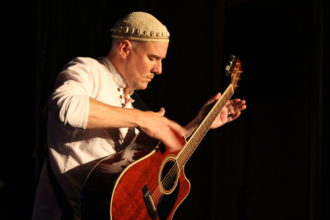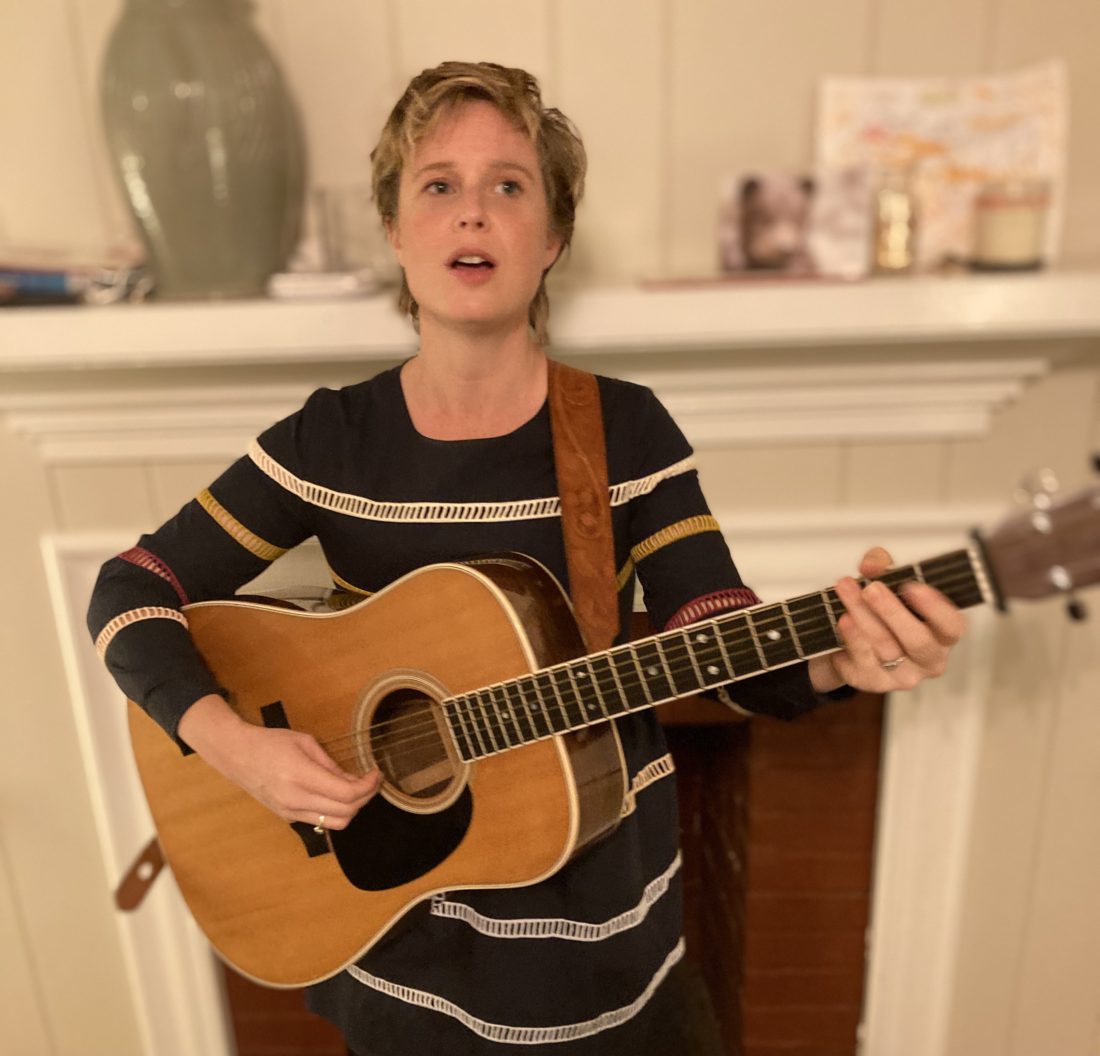“I try to push the envelope in terms of creative language for God and for church and all that kind of stuff, because why write what’s already been written?” says the Rev. David Eck, a musician and pastor of Abiding Savior Lutheran Church in Fairview. “Sometimes, contemporary Christian music is very repetitive, so I wanted to bring fresh language and fresh music styles to the table that were different from what I was hearing on Christian radio.”
With such musically rich communities in and around Asheville, it’s perhaps no surprise that Eck is not alone in his approach. But when and how church leaders introduce original songs to their congregations is a different story. And for some, the challenge of balancing their faith and their artistic vision creates further challenges as to when and where they share original works.
Reaching people’s hearts
For Eck, the son of a harmonica player, music was always part of his life. He studied voice through high school and began playing guitar at 16. By his senior year, he was writing original songs and in his 20s began playing shows and releasing independent albums. But amid his musical quest, he discovered another calling.
While attending a songwriting school in Nashville, colleagues recognized Eck’s talent and interest in religious guidance. “They encouraged my writing ability but said, ‘You can do something that not a lot of songwriters can do. You need to be a pastor, but you can do this on the side.’ And that was the best advice I got — and they were right.”
While studying at Lutheran Theological Seminary at Gettysburg, Pa., Eck found a passion for writing music for worship services, and shortly after being appointed pastor of Abiding Savior in 1993, he and his congregation recorded Abiding Savior Praise, a collection of his original songs.
“We realized our gift to the bigger church was to share our music,” he says. “We decided to make it available online and just ask for donations, and I’ve found that’s been a really great thing to do, especially during the pandemic.”
Congregations across the U.S. use Eck’s music, including Beyond Silent Night (a collection of 14 less familiar carols of the Advent and Christmas seasons) and Love Feast: Music for Worship. A fan of classic and prog rock, Eck says those influences can sometimes be heard on his originals as well as interpretations of traditional hymns.
“Music has always been a part of my faith journey. What I resonate with the most are the songs that the church sings — and that’s how I think people access theology better than anywhere else. They may kind of listen to a sermon, but they’re going to remember a hymn or a really great song,” Eck says. “As we’re going through difficult times, we access those songs, and they’re there for us. I think it reaches people’s hearts in a way that just words themselves do not.”

Pushed into performance
Unlike Eck, the Rev. Erin Maxfield-Steele of St. George’s Episcopal Church in West Asheville put her musical ambitions on the back burner to focus on her leadership role with the church and her family responsibilities. For years, most of her playing took place alone or with a few friends.
But amid the pandemic, she felt an urge to reconnect with her guitar in a more meaningful way. Since the onset of COVID-19, Maxfield-Steele has written several songs and performed at select outdoor venues.
“I haven’t played in Asheville very much, and I think partly because I don’t want people to have the expectations put on me that the collar already puts on me,” she says. “God is inviting me into a role that does not change me in terms of my external presentation. And so, in that way, I feel like the two roles are very compatible. But I do worry that if people knew that I was a priest playing a song, they would be looking for a hidden message or a hidden doctrine or dogma, and my songwriting doesn’t have any of that.”
While she considers a few of her original tunes Christian in theme and content, the majority of Maxfield-Steele’s numbers are stories or reflections unrelated to her faith.
“The process of songwriting and the process of writing a sermon and the process of prayer is allowing myself to take those parts that I don’t understand of myself, of the universe, of whatever’s going on around me, and just sort of move with them into a place of not knowing and allow that to be,” she says.
Given the way Episcopal liturgy traditionally places the priest, deacon and other worship leaders in somewhat of a performative position, Maxfield-Steele initially shied away from weaving her musical talents into her sermons, worried it would come across as self-indulgent. But a few weeks after the pandemic hit, just as the church was pivoting to virtual sermons, St. George’s parish musician resigned. Concern over copyright laws and the legality of streaming music prompted Maxfield-Steele to embrace the role.
“I was sort of pushed into performing in my wheelhouse, which is old gospel songs, old country songs, stuff that’s in the public domain, traditional stuff. And some hymns — what Episcopalians would consider ‘Baptist music,’” she says. “And it was great. So I did that for a while until we were able to hire a new church musician.”
Though Maxfield-Steele performed a trio of songs on All Saints’ Day, feeling that they conveyed that Sunday’s message better than any sermon could, she’s generally resumed separating her two worlds while still prioritizing more personal songwriting going forward.
“Dolly Parton says that songwriting is like praying for her, and I feel that, because you don’t know what it’s going to be,” she says. “You don’t know what it’s going to sound like. You don’t know what the whole story is sometimes until you put one word down, and then it shifts and changes.”
Stronger than unity
David LaMotte isn’t a pastor — but he’s also not not a pastor.
A self-described “musician who dabbles in faith work,” the Black Mountain-based artist is a practicing Quaker but maintains close ties to the Presbyterian world, with several ministers in his family. Unlike the Presbyterian church, he notes, Quakers hold meetings where everyone sits in a circle with no obvious person performing the role of the clergy, which makes it appear that such roles have been eliminated, when it’s actually the other way around.

“Quakers tend to believe that everybody is charged with the work of loving each other and thinking things through together — which is one way to describe what it is to be clergy,” he says. “So, in that sense, I guess I’m clergy in the way that all Quakers are clergy. But I’ve never been to seminary.”
That lack of formal training hasn’t kept LaMotte from being invited into religious spaces. In 2019, for example, he was asked to preach the baccalaureate sermon at Columbia Theological Seminary in Decatur, Ga. Furthermore, he’s often hired to work with clergy and faith communities on a national and sometimes international level, focusing on the core messages of his book Worldchanging 101: Challenging the Myth of Powerlessness, which argues for groups making small changes together rather than relying on a hero to inspire people who might not feel up to big, heroic tasks. And locally, he’s part of Faith 4 Justice Asheville under the leadership of the Rev. Tami Forte Logan, which works on racial and equity issues in Western North Carolina.
But he’s still foremost a musician, which creates a fascinating paradox.
“I’m a musician, and I’m Christian, and I’m not a Christian musician,” LaMotte says. “I want my music to be accessible to people in all sorts of traditions, and I think so often music that is tagged as ‘religious music’ just presents the answers. It doesn’t present questions, and that’s just not reflective of my own theology.
“As an artist, I love subtlety,” he continues. “And so, if people are listening really closely to my music, they’ll hear some of my theology in there, but it’s not dogmatic, and I hope it’s not preachy.”
At its core, notes the musician, his songs raise questions and offer space for other people’s perspectives. “Mystery is at the heart of my theology, so I need to approach anything theological with humility if I’m going to approach it honestly.”
He does just that in Abraham Jam, a trio with Jewish musician Billy Jonas and Muslim artist Dawud Wharnsby, which LaMotte describes as the one place where he’s commercially identified himself as Christian.
“One of our tag lines as a band is ‘Harmony can be even stronger than unity.’ You don’t have to sing the same note in order to create something beautiful together. You can sing different notes that resonate,” he says. “So it’s not about watering down our faiths. We each claim them quite deeply. And I’ve learned about my own faith from these guys of different faiths, and it’s just been a beautiful, beautiful project over the last decade.”



Before you comment
The comments section is here to provide a platform for civil dialogue on the issues we face together as a local community. Xpress is committed to offering this platform for all voices, but when the tone of the discussion gets nasty or strays off topic, we believe many people choose not to participate. Xpress editors are determined to moderate comments to ensure a constructive interchange is maintained. All comments judged not to be in keeping with the spirit of civil discourse will be removed and repeat violators will be banned. See here for our terms of service. Thank you for being part of this effort to promote respectful discussion.